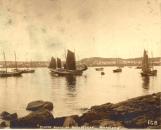29
Fishermen did business in a truck system. They would be outfitted with supplies and equipment by a merchant and pay off their debts with the fish they caught. Fishermen were perpetually in debt and at the mercy of the merchant class. This situation, combined with wrongs, real and imagined, perpetrated on the poor fishermen by the merchants, bred an animosity that permeated Newfoundland culture till modern times.30
Post card promoting the Fishermen's Protective Union and it's leader Sir William F. Coaker.1919
Bonavista Bay, Newfoundland

31
Attempts were made to break this cycle of dept. The most successful attempt was the Fishermen's Protective Union Led by Sir William Ford Coaker. He organized a fishery cooperative that put money in the pockets of fishermen by bypassing the St. John's merchants and dealing directly with overseas markets.33
Coaker spread his ideas through the Fishermen's Advocate, a newspaper published by the union. For the first time fishermen were organized. They became a political force with the power to control their own destinies.34
Death certificate of Frederick C. Roper who made the supreme sacrifice in World War I.27 November 1915

35
During World War I Newfoundland lost more young men per capita than any other country in the British Empire. Of the 6277 men accepted for service overseas by the Royal Newfoundland Regiment, 1232 lost their lives and 2314 were wounded. It has been said that they were the brightest and best and that the country never fully recovered from the loss.Frederick Roper was the son of John Roper. He left his home on the Mockbeggar Plantation to fight for King and country. He died in battle at Gallipoli. He was the first recruit from Bonavista to die in the Great War.





